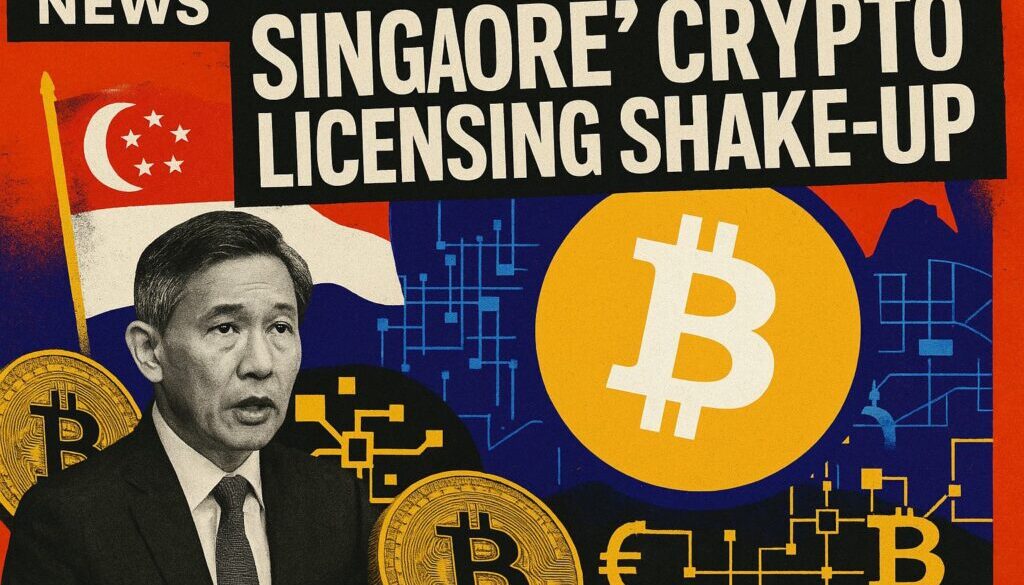Singapore’s Crypto Licensing Shake-Up: Navigating the New Regulatory Landscape

Singapore’s Crypto Licensing Shake-Up: Navigating the New Regulatory Landscape
Singapore has long been lauded as a progressive hub for financial innovation, particularly in the burgeoning blockchain and cryptocurrency sectors. However, the city-state’s regulatory environment is undergoing a significant transformation. The Monetary Authority of Singapore (MAS) has implemented stringent new licensing requirements, setting a firm deadline that has sent ripples through the digital asset industry. This shake-up compels numerous crypto firms to either comply with the rigorous new rules or face severe penalties, including hefty fines and potential jail time.
The MAS’s proactive stance aims to bolster regulatory integrity and safeguard investors, but it also presents a formidable challenge for businesses operating within its borders. As the June 30, 2025 deadline arrives, firms providing crypto services, especially to foreign clients, are at a crossroads, forced to make critical decisions about their future operations.
MAS’s Comprehensive Crypto Licensing Requirements
At the heart of Singapore’s new regulatory framework is the Digital Token Service Provider (DTSP) license, mandated under the Financial Services and Markets Act (FSMA). The MAS has made it unequivocally clear that all Singapore-based entities offering digital token services, particularly those serving overseas clients, must secure this license. The deadline for compliance was set for June 30, 2025, with no grace period for non-compliant firms.
The requirements for obtaining a DTSP license are stringent:
- Firms must demonstrate robust anti-money laundering (AML) and counter-financing of terrorism (CFT) measures.
- They are required to appoint local compliance officers.
- Regular cybersecurity audits are mandatory to ensure the security of digital assets and customer data.
- Approval is required for key personnel, including the CEO and directors, ensuring a high standard of governance.
Operating without the necessary DTSP license after the deadline means firms will be considered to be operating illegally. The penalties for non-compliance are severe, designed to deter illicit activities and enforce regulatory adherence. These include:
- Fines reaching up to $185,000.
- Potential jail time for individuals found in violation.
The MAS has emphasized that it will generally not grant licenses to businesses primarily serving cross-border clients without a significant nexus to Singapore, signaling a clear shift towards tighter control over the jurisdiction’s financial ecosystem.
Impact on Crypto Firms: Compliance vs. Relocation
The tightened regulations have created a challenging environment for many crypto firms. For smaller entities, the cost and complexity of compliance have proven insurmountable, leading to numerous shutdowns. Larger, more established players, while better equipped to handle the regulatory burden, are also weighing their options, often considering relocation to jurisdictions with more lenient or clearer regulatory frameworks.
Notable examples of firms contemplating or executing strategic shifts include:
- Bitget: This prominent crypto exchange has reportedly begun reassigning staff to offices in Dubai and Hong Kong, signaling a potential scaling back of its Singapore operations.
- Bybit: Another major exchange, Bybit, is also exploring similar options, looking towards Dubai and Hong Kong as viable alternatives for its global operations.
These relocations are driven by several factors, including the high cost of maintaining compliance in Singapore, the perceived strictness of MAS’s approach, and the attractiveness of emerging crypto hubs that offer more favorable conditions for growth and innovation. While Singapore’s regulations aim to enhance transparency and investor protection, critics argue that they risk stifling innovation and challenging the city-state’s long-standing reputation as a premier fintech destination.
Singapore’s Regulatory Philosophy and Future Outlook
Despite the exodus of some firms, the MAS’s intent behind these stringent regulations is clear: to safeguard regulatory integrity and maintain Singapore’s reputation as a trusted financial center. Calvin Shen from Hex Trust aptly noted that this initiative is primarily about ensuring robust regulatory oversight rather than outright restricting the industry. The focus is on weeding out bad actors and ensuring that firms handle digital assets responsibly.
However, the MAS’s approach also reflects a distinct supervisory risk appetite, as highlighted by Chengyi Ong from Chainalysis. This means Singapore is prioritizing a controlled and secure crypto environment, potentially diverging from international alignment in terms of regulatory leniency. The challenge for firms lies in balancing innovation with the increasing demands of regulatory adherence in a market that values stability and security above all else.
As the dust settles from this regulatory shake-up, the crypto landscape in Singapore will undoubtedly look different. While some firms may depart, those that remain and successfully navigate the licensing process will likely be stronger, more compliant entities, contributing to a more mature and secure digital asset ecosystem. Singapore’s journey reflects a global trend where regulators are increasingly seeking to establish clear boundaries and safeguards in the rapidly evolving world of cryptocurrency.


